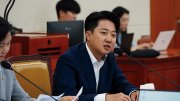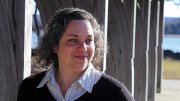In 2021, when Lee Junseok ’07 was elected chairman of South Korea’s conservative People Power Party (PPP)—becoming, at 36, the youngest-ever leader of a major party in the country—some likened his ascent to that of another controversial figure on the other side of the world. “South Korea has been visited by its very own Donald Trump,” wrote a reporter for the progressive newspaper Hankyoreh, pointing to Lee’s popularity among young men, a group that has historically been privileged but today feels left behind. Lee’s female opponent Na Kyung-won accused him of relying on the “politics of division,” as the former American president has done.
In the decade before his rise to party leadership, Lee was mostly known as a political commentator with an eloquent, brash speaking style and a penchant for bucking convention. His supporters believed those qualities would help him propose radical solutions to deeply rooted challenges such as extreme competition in education and employment and the world’s lowest birth rate.
Others accused him of pandering to young male voters by blaming their economic and social problems on feminism and government policies intended to address sexism. When the PPP beat the liberal Democratic Party in 2021 mayoral elections, Lee credited the success to his opponents’ “fixation on a pro-woman agenda.” During the 2022 presidential election, he proposed abolishing the Ministry of Gender Equality and Family, arguing it was no longer needed. He has claimed that novels and movies encourage young women to “develop an unfounded victim mentality.” In South Korea, women account for the overwhelming majority of violent crime victims and face the worst gender pay gap among the 38 member nations of the Organization for Economic Cooperation and Development (OECD).
But Lee says his politics aren’t Trumpian. In fact, he fashions himself after a different American president—Barack Obama, J.D. ’91. Lee first heard of Obama as an undergraduate, after the Illinois senator’s breakout speech at the 2004 Democratic National Convention. Some fellow students downloaded copies of the address to their iPods; listening to it, Lee, too, was moved by Obama’s sweeping calls for unity and hope. He realized then “that a person’s speech can have a big impact on society,” he says—that it wasn’t only businesspeople and scientists who could change the world, but also effective communicators who offered new ways of seeing it.
Today, Lee sees himself as a political maverick driven by many of the ideals of the early Obama era: meritocracy, equality of opportunity, diversity of opinion, a belief in the liberal world order. (His passion for oratory came from Obama, too.) He argues these values do not fully align with either major party. Yet he believes they are essential to guiding South Korea beyond the growing pains of the past 75 years—during which it has transformed from one of the poorest nations in the world to a wealthy democracy—and into the future.
In January, Lee founded the New Reform Party to advance this political mission. Though it has had a shaky start—several early members left, and its approval ratings are in the single digits—Lee in April edged out a competitor from the major liberal party to win a parliamentary seat representing a district near Seoul where the average voter age is 35, one of the lowest in Korea. His ambitions clearly reach higher: he has declined to rule out a presidential run. Lee embodies one approach to a series of problems that, while advanced in South Korea, are shared by much of the rest of the world: a falling birth rate, stagnating economic growth, and a Gen Z electorate increasingly divided along gender lines. He has certainly proposed the radical solutions his supporters believed he would. But some Koreans wonder: solutions for whom?
Lee was born and grew up in Seoul, where his mother taught high school and his father led global sales for Shinhan Securities. When he was in sixth grade, his father was transferred to Singapore and then Indonesia, where Lee attended British schools and learned English. He went on to Seoul Science High School—attracted less by a passion for science, he says, than by its elite reputation—and was then accepted at Harvard. A Korean government scholarship aimed at science and technology education covered his full tuition, and in his freshman year, he got a job as a user assistant for Harvard University Information Technology, fixing computers in the basement of the Science Center alongside some of Facebook’s cofounders. Seeing their energy and excitement, he decided to concentrate in computer science and economics and aspired to work in the tech industry himself.
But his favorite courses were in government and East Asian languages and civilizations; there, his political philosophy was seeded. Growing up, for example, Lee had learned that Park Chung Hee, Korea’s president from 1963 to 1979, was a conservative hero. Park led the country’s industrialization—but at the cost of widespread human rights violations and political repression. Despite his authoritarian tendencies, he remains admired for his economic legacy by many Koreans, especially conservatives.
But Lee remembers professor of government Steven Levitsky challenging that framing, comparing Park, counterintuitively, to Vladimir Lenin: both prioritized state interests over individual rights and relied on central economic planning. Lee began to realize that South Korea’s political binary was still shaped by the country’s twentieth-century history, with conservatism largely defined by support for industrialization and liberalism by pro-democracy activism. But that division no longer made sense in a wealthy democracy—and needed to be revamped for the new millennium.
This has become the animating force of his political career, Lee says: providing Korean voters a new choice rooted in classical liberalism, the belief “that the government’s role should be minimized, and people should have more liberty and freedom.” That includes the conviction that individual rights should take precedence over collective well-being.
Lee didn’t always plan to go into politics. After graduation, he returned home and worked for three years as a software developer, an alternative to traditional military conscription. During that time, he launched Edushare, a nonprofit that helps underprivileged children learn math. Then in 2011, when Lee was 26, Park Geun-hye—Park Chung Hee’s daughter—recruited him to join the emergency leadership council of her party, the predecessor to today’s conservative PPP. When Park ran for president in 2012, he advised her on connecting with young voters. He helped to promote a campaign centered around “individual happiness” that challenged traditional conservative themes of putting the country first—which, Lee says, no longer appealed to young people.
Park was impeached on charges related to influence peddling in 2016; meanwhile, Lee began to seek elected positions himself, unsuccessfully running for the National Assembly in 2016, 2018, and 2020. His campaigning and political commentary on television and social media built his anti-establishment reputation. In 2019, as protests erupted in Hong Kong against a controversial policy that would allow extradition to China, Lee traveled there to support the protestors. Criticizing the hesitant stance of both parties, he argues that protecting individual rights in Hong Kong was more crucial than South Korea’s collective economic interests in trade with the People’s Republic.
Lee’s stance on gender, he says, aligns neatly with his other positions. Policies benefiting women as a group may have made sense in the twentieth century, when it was common for Korean families to prioritize boys’ educations. But women’s rights, like the economy, appear to have advanced rapidly. In 2008, women’s college enrollment began to outpace men’s, and in recent years, men in their twenties have faced a higher unemployment rate than their female peers. In this context, Lee argues, affirmative-action policies requiring higher percentages of women in the president’s cabinet, or giving them a boost in hiring, are outdated and unfair to men—another misguided prioritization of collective well-being over individual opportunities.
During the 2021 race for party chair, some young men saw in this rhetoric a reflection of their own beliefs that no politician had voiced before. Never having won an elected position, Lee was an unconventional pick to lead the party. But he helped secure a victory in the 2022 presidential election for PPP candidate Yoon Suk Yeol: 59 percent of male voters under 30 voted for the PPP, compared to 34 percent of women in the same age group.
After the election, however, Lee’s confrontational style began to affect his ability to work with other members of his party: his tenure was marred by frequent conflicts with Yoon. Then, in July 2022, Lee was suspended from the party over accusations that he had received sexual services as bribes in 2013 and tried to destroy evidence. Lee denies these allegations, and the police did not refer him for prosecution. Though his suspension was reversed in November 2023, Lee left and founded the New Reform Party (NRP) a few months later.
By promoting “freedom of speech and freedom of ideas,” Lee hopes the NRP can provide a platform for unconventional thinking. In that spirit, during his campaign for the National Assembly this year, he made several explosive policy proposals. One would require women who want to become police officers and firefighters to first serve in the military because, he argues, as South Korea’s population decreases, the nation needs to find ways to maintain the size of its army. He also proposed replacing unlimited free subway rides for people over 65 with a yearly voucher worth about $90, maintaining that the current system is unsustainable as that share of the population continues to grow—from one-fifth of Koreans in 2023 to nearly one-half projected by 2072.
Lee knew both proposals would be controversial. The public remains deeply divided on female conscription; a 2023 survey found 55 percent opposed. And the transportation fare system has long been the center of fierce debate, with critics of plans like Lee’s pointing to South Korea’s high elderly poverty rate. Lee says he’s willing to burn political capital to start conversations others are afraid to: “We know things are going to explode within our lifetime, so we want to put [these ideas] on the table before it’s too late.”
Lee hopes the NRP can provide a forum to debate other policies—including those related to gender. He acknowledges that barriers remain to women’s workplace advancement: nearly half of women leave their jobs after giving birth, for example, and women’s labor-force participation drops by about 10 percentage points when they enter their late thirties. Lee says he is opposed to group benefits to address this inequity, proposing instead solutions that make it easier for individual women to remain in the workforce, such as subsidizing child-care centers near workplaces. But the pressure experienced by new mothers to quit their jobs extends beyond individual beliefs and actions; it is deeply rooted in collective cultural norms and expectations.
And in a democracy, actually implementing changes requires a collective effort: understanding the beliefs of those who disagree, empathizing with experiences different from one’s own, and building consensus. Some doubt whether Lee is willing to do so. In August, Korean media discovered multiple Telegram chatrooms where boys and men were distributing AI deepfake pornography. The hundreds of victims were their classmates, their teachers, their fellow soldiers. Korean women have argued this is just the latest example of a longstanding, structural misogyny—obscured to some by women’s advances in certain areas, but as ugly as ever beneath the surface. Lee’s public response was that the risk has been exaggerated, along with a warning against “overregulation.”
And about those presidential ambitions? “Whenever the Korean media asks me, I say something vague,” he says. But to Harvard Magazine, he admits, “I really look forward to getting the opportunity to run for the presidency one day.” It’ll be up to the public to decide whether Lee is achieving his goal of breaking an old binary in Korean politics—or just breaking Korean politics.









